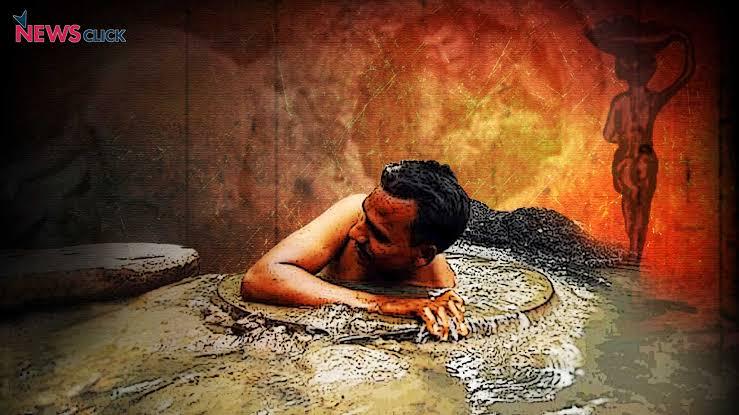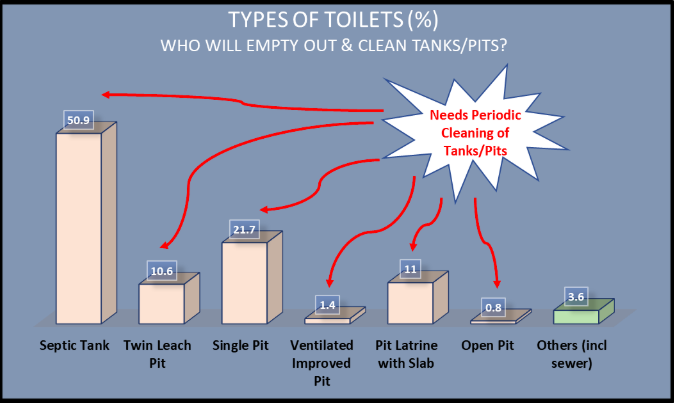Swachh Bharat: Who Will Clean & Empty Out 9.8 Crore Septic Tanks/Pits?

A recently released survey report says that over 96% of toilets in rural India have either septic tanks or different kinds of pits to collect human excreta. [See chart below] The report (#584) is based on a survey carried out by the National Statistical Office (NSO), formerly known as NSSO, under the ministry of statistics. Since the Swachh Bharat Mission (Gramin) officially claims that over 10 crore individual household latrines have been built as of date, there have to be about 9.8 crore such septic tanks and pits out there.
However, there is no word about whether these tanks/pits are being emptied out and cleaned. In fact, there is no money kept aside for this essential task. It is the responsibility of the owner.
It takes a couple of years for a septic tank to fill up and need cleaning. Open pits will fill up faster. Even if there is a system of liquid leaching out (as is the case with most of them) the faecal sludge that remains behind will need to be removed. It is only in the twin leach pit that this faecal sludge will become free of pathogens and odours – but they make up only about 10.6% of the constructed toilets. Even then, the dry sludge in such systems will need to be removed.

Who is going to do this? Ideally, there are machines mounted on trucks that can pump out the sludge (if in a semi-liquid form) and dispose it off somewhere. But no such measure is mandated nor are any funds kept for such machines which cost upwards of Rs.12 lakh each.
This means that families which are proud owners of these toilets will either (a) hire a manual scavengers team to clean the tank/pit periodically; or (b) pay a contractor who has a machine to do the job, if they can find one nearby.
Since we are talking about rural India here, the chances that a convenient machine will be available for hire nearby are remote at least for now. On the other hand, manual scavenging is an age-old practice and there are designated sections of people – designated by their caste – who are supposed to do this ‘dirty’ work, no matter that this inhuman practice is officially illegal.
So, in all probability the practice of manual scavenging will be the path of choice. That is, some people will be summoned and paid for emptying out the collected excreta in the tank/pit using buckets, lowering themselves into the sludge. They will then take it out somewhere – some drain or nallah, or some empty field or barren land – and dump it there. Several micro-surveys have confirmed that this is what is happening.
On the other hand, if a family does not do this, the only other option would be to stop using the latrine. Otherwise their septic tank or pit will overflow.
Has the govt., which has been proudly talking about the revolution brought in by the Swachh Bharat Mission, considered all this? On paper, yes, they say that periodic cleaning is a must. In fact, they have recently released a Standard Operating Procedure (SOP) for cleaning sewers and septic tanks, drafted by a premier institution, the Central Public Health & Environmental Engineering Organisation (CPHEEO), under the Ministry of Housing & Urban Affairs. It gives detailed guidance on how many types of safety equipment are essential for those who do this work (44 types) and lays down exact protocol for cleaning. But on the ground, in distant far flung villages, will this really happen?
More likely, the manual scavengers will work as usual – and continue to die as usual. According to estimates by the Safai Karmachari Andolan (SKA), approximately 2000 manual scavengers die every year based on media reports. These do not fully record the number of such deaths while cleaning septic tanks. Now, with so many new septic tanks these deaths may mount and the illegal practice of manually removing human excreta will get a new shot of life.
Get the latest reports & analysis with people's perspective on Protests, movements & deep analytical videos, discussions of the current affairs in your Telegram app. Subscribe to NewsClick's Telegram channel & get Real-Time updates on stories, as they get published on our website.
























